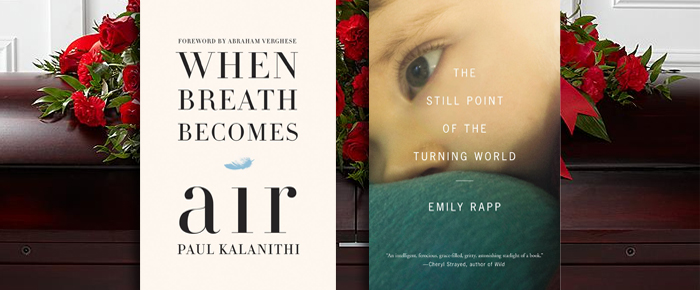
Bby Heidi Simmons
—–
When Breath Becomes Air
by Paul Kalanithi
Memoir
and
The Still Point of the Turning World
by Emily Rapp
Memoir
—–
We are all mortal. Death is inevitable, yet it is something we rarely talk about.
As uncomfortable as death is, two excellent books take the reader to the private depths of despair and the emotional challenges of living with the dying.
A wife honors her husband in When Breath Becomes Air (Random House, 238 pages) and a mother mourns her son in The Still Point of the Turning World (Penguin, 272 pages). These first person narratives shed light not only on the sadness of death, but how very profound life is.
When physician and author Paul Kalanithi was diagnosed with terminal lung cancer, he decided to write about his life and pending death for himself, his baby daughter and the medical community. He wrote until he couldn’t physically write anymore. His wife, also a physician, finished the book in an extended epilogue.
Author Rapp had a beautiful baby boy who was diagnosed with a fatal brain defect and she chose to write about the life-altering experience of slowly accepting losing her beloved child.
Both books provide a brave, thoughtful and intimate look at being close to death and the deep emotional impact on those who survive and must carry on.
In a recent stop-over in the Coachella Valley, Lucy Kalanithi, Paul’s widow, met with UCR professor and author Rapp to discuss “Writing the Medical Narrative.” After Paul died, Rapp was hired by the publisher to help Lucy finish her husband’s book. They became fast friends.
The women talked for more than an hour at the Rancho Las Palmas Omni Hotel & Resort about the writing and publishing process. With no outward sign of personal grief, Rapp and Kalanithi have become experts at talking about the hardest subject of all — the death of a loved one. Calm, present, soft-spoken, genuinely pleasant and sometimes humorous, the women engaged in the subject of writing the medical narrative.
Rapp defined “medical narrative” as writing anything pertaining to the body as memoir and non-fiction. The loved ones of Rapp and Kalanithi died slowly from disease allowing the authors time to consider the nature and consequences of the illness during the writing process. The experience with doctors and the medical treatments are detailed in the pages.
When Paul first got sick, he wrote an essay about his eventual death that went viral garnering the attention of literary agents. From that piece, a book deal became a reality. Lucy shared the story of how wonderful the publisher was in wanting to honor her husband’s dying wish to complete his book and keep it in his words.
Kalanithi considered how her husband — as a lover of literature and doctor — always had a fascination about human mortality with a curiosity and desire to write about it. Not saying it was a self-fulling prophesy, Lucy noted the irony that he did exactly that.
“It’s not a burden to talk about my husband. If I didn’t have that, I’d feel isolated,” said Lucy. “Living in the real world, connecting to others makes me happy.”
Rapp and Kalanithi shared how their books have reached people around the world and that their story’s serve others in need. Rapp disclosed how incredibly difficult and emotional catharsis writing is. Reading these books, the honesty is so visceral, I felt the pain and loss as if I were a family member. (Read my reviews at www.coachellavalleyweekly.com)
Kalanithi shared how much of her husband’s identity was caught up in the future as a brilliant young neurosurgeon and scientist. And that after his diagnosis, he faced an existential crisis. “It was the writing process that sustained him,” Lucy said. “The writing gave him purpose and an identity and a way he could continue to help people.” The book was published posthumously.
Both Rapp and Kalanithi agreed that the medical narrative provides structure. The act of writing the story allows to reconstruct and restore the deep fracture.
“When you get a diagnosis of death for you or someone you love, it’s so disorienting,” said Rapp. “Writing gives you work to do and there’s an internal logic that is unique to you. It helps restore your identity.”
There is something special and brave about coming to terms with dying. Understanding death, the pain and suffering it brings, seems a healthy way to embrace life more fully.
“My marriage didn’t end when I became a widow,” said Lucy. “It is the most profound experience a human being goes through.” When Breath Becomes Air is a bestseller and Lucy divides her time seeing patients, being a mother and speaking about the book. “I’m proud that Paul lives on in the future.”











































